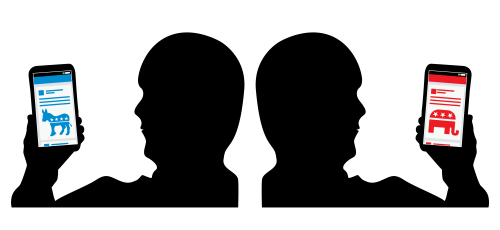 For the more than 200 million Americans on Facebook, scrolling through their newsfeeds without finding a single political post has become practically impossible.
For the more than 200 million Americans on Facebook, scrolling through their newsfeeds without finding a single political post has become practically impossible.
Social media platforms like Facebook have become the main political news source for many American voters, and especially for young adults. According to a survey conducted by Pew Research Center, 61 percent of millenials get their political news from Facebook.
Using social media sites as a platform for sharing political news can be beneficial and in getting users actively involved in politics through sharing articles and participating in political discussions with other users. But it also poses the risk of facilitating confirmation bias, the psychological inclination to reject information that conflicts with an accepted belief and accept information that confirms it. By allowing users to “mute” the posts of friends whose political beliefs contradict with theirs or unfriend them altogether, Facebook can allow users to isolate themselves from political news that challenges their existing beliefs.
DePaul senior James Hughes believes this prevents constructive political discussion online.
“(The ability to mute and de-friend people on Facebook) has shown itself to be an issue this election as it often leads to unintelligent, unnecessary discussion (online),” Hughes said. “Often, degrading remarks are made and nothing useful comes of it. Political discussions should be civil and, more often than not, face-to-face. Although social media’s intention to provide a forum for people to talk about anything is good, internet trolls and people who get ‘brave’ behind their computer screen destroy its value as a legitimate discussion forum.”
Not only does Facebook provide a platform for sharing political news, but it also tracks the political leanings of its users based on the pages they like, categorizing them as very liberal, very conservative or somewhere in between. Advertisers, including political campaigns, can pay Facebook to use this information in targeting specific audiences.
The Pew Research Center found that significant differences between Facebook users categorized as very liberal and very conservative in how they consume and tailor their political news. Consistent liberals were more likely to de-friend someone on Facebook due to their political views while consistent conservatives were more likely to see political opinions that mirror their own.
DePaul senior Zoé Kraft said Facebook users who resist the urge to shield themselves from different political views benefit from getting their news on social media.
“A lot of people don’t like to associate with others that have different viewpoints, but I’m sure there are just as many people, like me that understand how to at least hear the other side,” Kraft said. “I think it’s interesting when people share their viewpoints. You learn a lot more about them as individuals.”
But even for users actively searching out political news that supports different political leanings, using Facebook as a main news source still has its issues. Human editors originally managed Facebook’s “Trending” stories, but the company has since replaced them with algorithms. This switch has proven problematic, as multiple Trending stories have been either fake or wildly inaccurate.
An investigation conducted by The Intersect, a Washington Post blog, found “five trending stories that were indisputably fake and three that were profoundly inaccurate” from Aug. 31 to Sept. 22.
Despite the danger in Facebook promoting fake or inaccurate news stories, Hughes and Kraft don’t think the social media site has a responsibility of ensuring the political news shared by its users is legitimate.
“Unfortunately, I don’t think they have the responsibility,” Kraft said. “It is a social media site and people don’t make accounts with a guarantee of being educated in any way. However, I do think it would be beneficial to work towards eliminating bias (in users’ newsfeeds). Having said that, it will only work if people are willing to hear both sides.”
Despite the many pitfalls of millenials using Facebook as their main source for political news, there is no sign users will change the way they consume their news anytime soon.
Still, some remain optimistic about the possibilities of sharing political news that social media platforms hold.
“People receiving news through social media is (a) step forward in my opinion,” 20-year-old Uptown resident Jon Lundquist said. “Way more people are informed nowadays about current issues because of social media. Besides, many news outlets are heavily biased and corrupt themselves.”
Facebook has responded to critiques of the site’s management of political news, placing responsibility of consuming balanced coverage on the users themselves.
“Individual choice has a larger role in limiting exposure to ideologically cross-cutting content (than the newsfeed algorithm),” a study conducted by Facebook’s data team said.
Facebook and other social media platforms have become dominant forces in sharing political news and shaping the debates surrounding it, but they’re far from perfect. The majority of millenials currently using Facebook as their main news source will only find balanced, factual and unbiased election coverage by going beyond what is provided by their newsfeed.

